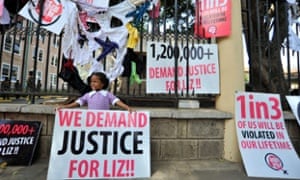Violence Against Women
Source: The Guardian
Justice has finally been served for a 16-year-old girl who was gang-raped and left for dead in Kenya's Busia county in June 2013.
The girl, known as Liz because her full name cannot be disclosed for legal reasons, has been supported by nearly 2 million people, and her case spawned the #JusticeForLiz social media campaign.
On Monday morning, three men were convicted and sentenced to 15 years for rape, and seven years for causing grievous bodily harm.
The case has exposed the cracks in Kenya's legal system, where prosecutions are few and far between for sexual violence and cases have complex challenges to overcome.
Monday's verdict is sure to have a ripple effect across the nation, and hopefully the region at large.
Around the world, girls experience difficulties accessing justice – particularly during adolescence. Like many countries, Kenya is experiencing a sexual violence epidemic and authorities are only beginning to grasp the magnitude of the task at hand.
The fact that Liz's case took so long to reach this point – and still faced serious obstacles despite strong national and global support – illustrates the injustices experienced by survivors in a criminal justice system in transition. While Kenya boasts one of the most progressive legal and policy frameworks for addressing sexual violence, Liz's case and countless others have revealed significant failures of local authorities to adequately address sexual violence.

Negative cultural attitudes towards women, as well as the fear and stigma associated with such crimes, make reporting of cases a daunting and often impossible task. Recent national statistics are not easy to come by. A report published by Crime Scene Investigation Nairobi in 2008 estimated that 19 out of 20 rapes in Kenya are not reported and are therefore unpunished. In 2013, the Gender Violence Recovery Centre said more than 2,500 cases of sexual violence were reported in 2011-2012. Meanwhile, nationally the number of rape cases involving children has increased, while new figures from Kenya's National Crime Research Centre show that violence against women and girls continues to be at incredibly high levels. Wife/husband battery is at 97.7% prevalence in Mombasa county and not much lower throughout the nation.
In Liz's case, three of the six alleged perpetrators are still at large, although it has been a year since arrest warrants were issued. Sensitive treatment of survivors of sexual violence is also almost universally lacking. If a survivor overcomes the huge initial hurdle to report what happened, apathy or a lack of knowledge of laws, policies and procedures by officials, and the continued lack of resources, mean that cases are often handled poorly from the outset.
Liz's case, and the failure of local authorities to adequately address sexual violence, drew national and international attention to Busia county. However, it is only the tip of the iceberg.
Related investigations revealed compelling evidence from Busia that thousands of other survivors of sexual violence continue to suffer injustice due to obstacles within the justice system. Deep-rooted concerns are particularly widespread in Kenya, relating to the abuse of power and corruption by the police service and key government officials, as well as a tendency for the victim to be blamed for what happened.
However, progress is being made too, on the back of concerted action by national and international human rights groups. Last year, Equality Now wrote to the Director of Public Prosecutions, detailing 70 additional rape cases compiled by our partners, which had yet to be properly investigated. Less than a month later, the DPP responded to say that he had contacted the Criminal Investigations Director calling for "speedy and thorough investigations" into these cases and that he had appointed a special unit to provide guidance throughout the process.
Liz has finally received justice and her case will hopefully continue to be a wake-up call for all. We at Equality Now hope that it can also be used to highlight the gaps in policies and procedures. Authorities must be held accountable and we must continue to push for safe environments for girls, where sexual violence is not tolerated and is punished to the fullest extent of the law.
There is potential to use knowledge gained from this case to help clarify the role of special prosecutors and intermediaries, and to better protect survivors of sexual violence during the entire legal process. There is also an opportunity now to learn from best practice and to push for further implementation of the law and the bolstering of systems which protect the rights of Kenyan girls and women.
The Kenya we want – one where girls and women have the freedom to access and enjoy their rights – is within reach. Liz has bravely helped to pave the way forward to ensure justice for Kenyan girls. We must maintain this momentum to ensure that nobody is left behind.
